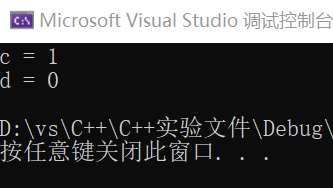众所周知的(也是学校教的),就是先自增再赋值还是先赋值再自增的区别。
#include<iostream>
using namespace std;
int main()
{
int a = 0;
int b = 0;
int c = ++a;
int d = b++;
cout << "c = " << c << endl;
cout << "d = " << d << endl;
return 0;
}
从这个方面来看,++i与i++的区别(尤其是性能方面)没有什么差别,很多同学也并没有思考过这个问题。
下面是两段源码及其通过vs反汇编得到的汇编代码:
使用++i
#include<iostream>
using namespace std;
int main()
{
for (int i = 0; i < 100; ++i)
{
cout << "hello world" << endl;
}
return 0;
}#include<iostream>
using namespace std;
int main()
{
00552540 push ebp
00552541 mov ebp,esp
00552543 sub esp,0CCh
00552549 push ebx
0055254A push esi
0055254B push edi
0055254C lea edi,[ebp-0Ch]
0055254F mov ecx,3
00552554 mov eax,0CCCCCCCCh
00552559 rep stos dword ptr es:[edi]
0055255B mov ecx,offset _57B8321F_源@cpp (055F029h)
00552560 call @__CheckForDebuggerJustMyCode@4 (055137Fh)
for (int i = 0; i < 100; ++i)
00552565 mov dword ptr [ebp-8],0
0055256C jmp __$EncStackInitStart+2Bh (0552577h)
0055256E mov eax,dword ptr [ebp-8]
00552571 add eax,1
00552574 mov dword ptr [ebp-8],eax
00552577 cmp dword ptr [ebp-8],64h
0055257B jge __$EncStackInitStart+5Ch (05525A8h)
{
cout << "hello world" << endl;
0055257D mov esi,esp
0055257F push offset std::endl<char,std::char_traits<char> > (055103Ch)
00552584 push offset string "hello world" (0559B30h)
00552589 mov eax,dword ptr [__imp_std::cout (055D0D4h)]
0055258E push eax
0055258F call std::operator<<<std::char_traits<char> > (05511A9h)
00552594 add esp,8
00552597 mov ecx,eax
00552599 call dword ptr [__imp_std::basic_ostream<char,std::char_traits<char> >::operator<< (055D0A0h)]
0055259F cmp esi,esp
005525A1 call __RTC_CheckEsp (055128Fh)
}
005525A6 jmp __$EncStackInitStart+22h (055256Eh)
return 0;
005525A8 xor eax,eax
}
使用i++
#include<iostream>
using namespace std;
int main()
{
for (int i = 0; i < 100; i++)
{
cout << "hello world" << endl;
}
return 0;
}#include<iostream>
using namespace std;
int main()
{
008B2540 push ebp
008B2541 mov ebp,esp
008B2543 sub esp,0CCh
008B2549 push ebx
008B254A push esi
008B254B push edi
008B254C lea edi,[ebp-0Ch]
008B254F mov ecx,3
008B2554 mov eax,0CCCCCCCCh
008B2559 rep stos dword ptr es:[edi]
008B255B mov ecx,offset _57B8321F_源@cpp (08BF029h)
008B2560 call @__CheckForDebuggerJustMyCode@4 (08B137Fh)
for (int i = 0; i < 100; i++)
008B2565 mov dword ptr [ebp-8],0
008B256C jmp __$EncStackInitStart+2Bh (08B2577h)
008B256E mov eax,dword ptr [ebp-8]
008B2571 add eax,1
008B2574 mov dword ptr [ebp-8],eax
008B2577 cmp dword ptr [ebp-8],64h
008B257B jge __$EncStackInitStart+5Ch (08B25A8h)
{
cout << "hello world" << endl;
008B257D mov esi,esp
008B257F push offset std::endl<char,std::char_traits<char> > (08B103Ch)
008B2584 push offset string "hello world" (08B9B30h)
008B2589 mov eax,dword ptr [__imp_std::cout (08BD0D4h)]
008B258E push eax
008B258F call std::operator<<<std::char_traits<char> > (08B11A9h)
008B2594 add esp,8
008B2597 mov ecx,eax
008B2599 call dword ptr [__imp_std::basic_ostream<char,std::char_traits<char> >::operator<< (08BD0A0h)]
008B259F cmp esi,esp
008B25A1 call __RTC_CheckEsp (08B128Fh)
}
008B25A6 jmp __$EncStackInitStart+22h (08B256Eh)
return 0;
008B25A8 xor eax,eax
}
哈哈哈哈哈,有的同学已经发现了,好像并没有什么区别。
之前的说法是++i比i++的效率更高,但随着编译器的不断优化,两者简单应用时并没有什么区别。
但是,真是如此吗?
i++使用时,要先用将自身数据拷贝到临时变量中,再自增,最后传输临时变量。
而++i并不需要这般麻烦,直接自增再传输即可。一些追求压缩空间和时间的嵌入式工程师往往喜欢使用++i。
下面通过运算符重载自实现++i和i++来解释:
#include<iostream>
using namespace std;
class MyInt
{
friend ostream& operator<<(ostream& cout, MyInt& a);//友元
public:
MyInt();
MyInt& operator++();//前置++
MyInt& operator++(int);//使用占位参数区别前后置++,使之可以发生函数重载
private:
int m_num;
};
MyInt::MyInt()
{
this->m_num = 0;
}
MyInt& MyInt::operator++()
{
this->m_num++;
return *this;
}
MyInt& MyInt::operator++(int)
{
static MyInt temp = *this;
this->m_num++;
return temp;
}
ostream& operator<<(ostream& cout, MyInt& a)
{
cout << a.m_num;
return cout;
}通过上面的代码显而易见其区别,且后置++难以实现链式编程。
普通简单使用的情况下,两者并没有什么区别。
但在某些机器情况下或在类中使用时,++i的效率更高。
初学小白可以养成使用++i而非i++的习惯哦!